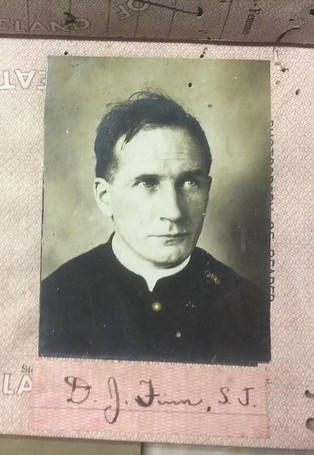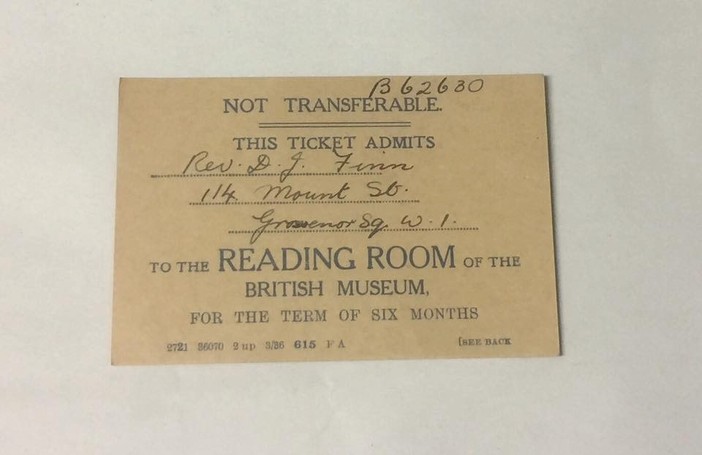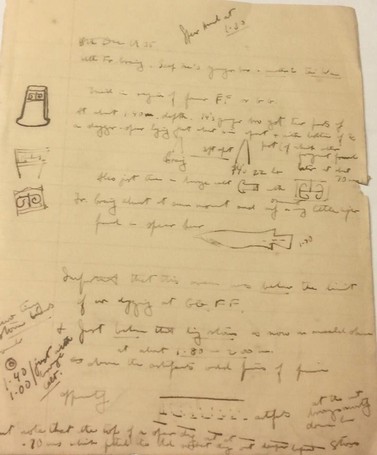
Connect
Alumni Networks
What's On
Ricci Hall Old Boys’ Association
The 80th Anniversary of passing of Rev Father Daniel J. FINN, S.J.
「豈無佳色在、留待後人來」 ——敬悼范達賢神父八十周年忌辰
Nov 1, 2016
By Nixon Leung (BSc 2014; MEd 2015)
Co-Convenor
Ricci Hall Archives Conservation and Acquisition Project (RHACAP), HKU
On behalf of the Ricci Hall Archives Conservation and Acquisition Project (RHACAP), HKU, it is a great honour and privilege to share the life story and legacy of the late Rev Father Daniel J. Finn, S.J., at the commemoration of the 80th anniversary of his passing.
Father Finn was born in Ireland in 1886. He read literature and archaeology at the Universities of Dublin and Oxford. Joining the Society of Jesus in 1902, Father Finn conducted missionary work and served as an educator in Austria, Hungary, Poland, Australia and China. In 1927, Father Finn arrived in Hong Kong and taught in the Departments of Education and Geography at this University. He was the one of the earliest residents of Ricci Hall, and later served in the South China Regional Seminary.
The archaeological discoveries of Father Finn were closely related to his missionary work in Hong Kong. While visiting a chapel in Aberdeen he saw a ship unloading sand that had been collected from Lamma Island, an outlying island known as Pok Liu Chau back then. Father Finn spotted copper arrows and pieces of clay in the sand, promoting him to visit the beaches of Lamma Island. He saw a local lady picking up a clay vase from the sand as she worked, and then casually tossed it aside before continuing her work. The vase broke, and so did Father Finn’s heart. He immediately knew there was an urgent need for conservation and the preservation of historical artefacts in Hong Kong.
With the support of the colonial government, Father Finn started an excavation project in 1933 and published his finds in a range of journals including The Hong Kong Naturalist. A number of these articles were republished by Ricci Hall in 1958 as Archaeological Findings on Lamma Island near Hong Kong. Although the excavation methods were less than ideal, the project was the first rescue excavation ever conducted in Hong Kong. Father Finn found a number of clay vessels, stone blades, and stone axes from the Neolithic Age (also known as the “New Stone Age”), and copper spears and tools from Shang to Han Dynasties. The finds proved that early human settlement in Hong Kong could be traced back to the Neolithic Age.
Appointed by the colonial government and the University as a delegate of Hong Kong, Father Finn attended the Second International Congress of Pre-historic & Proto-historic Sciences in Oslo, Norway in 1936 to report his research findings. After the conference, Father Finn travelled to London to conduct library research at the British Museum. Tragically though, Father Finn was afflicted by some kind of blood poisoning and passed away on 1st November 1936 at the mere age of 50.
Father Finn is a role model for missionary work, education and archaeological research. He carried out his studies in his spare time and recruited students to help. He was more than willing to teach and share with his mentees. His residence resembled a display room full of physical artefacts from different time periods.
Following in Father Finn’s footsteps and upholding the spirit of truth, RHACAP’s research on hall history kicked off earlier this year, with the support of the Society of Jesus, Ricci Hall Old Boys’ Association (RHOBA), Ricci Hall Students’ Association (RHSA), HKUSU, and the assistance of more than 20 current students. Upon completion of professional training in archiving and oral history provided by our fellow RHACAPers, the team catalogued 20,498 photos, 138 bulletins, 19 The Riccian, and 4 Thus Spake the Riccians items. We have also uncovered 232 flags and 69 boxes of video tapes. A further 41 bulletins and 8,626 photos were digitised. In addition to archiving and record management, we successfully conducted 16 oral history interviews with our alumni.
Father Finn’s legacy lives on, with his fondly remembered scholarly endeavours and acts of kindness, at Ricci Hall. We believe Father Finn, a kindred soul who walked into the arms of God 80 years ago, looks back and watches over us in this quest for knowledge, understanding, and solidarity.
「豈無佳色在、留待後人來」 ——敬悼范達賢神父八十周年忌辰
梁迭起 (BSc 2014; MEd 2015)
香港大學利瑪竇宿舍文物保育及徵集計劃聯席召集人
2016年11月1日,是為耶穌會范達賢神父八十周年忌辰,本人謹代表香港大學利瑪竇宿舍文物保育及徵集計劃,冒昧以禿筆屬文,以念先賢。
范神父1886年生於愛爾蘭,學生時代成績優異,頂角崢嶸,脩讀文學及考古,負笈都柏林大學、牛津大學。1902年加入耶穌會, 曾於奧地利、匈牙利、波蘭、澳洲、中國等地進脩宣教。1927年范神父來港,嗣後任教香港大學教育學系和地理學系,以及在華南總修院事奉。
范神父與本港考古的因緣與傳教密不可分。神父到鴨巴甸(香港仔)修院行祭,看到有船將建築用的泥沙卸岸,神父在沙中撿拾到銅矢、陶片等不完整的古物,後來得知沙泥由舶遼洲(南丫島)運至。神父遂幾度前往舶遼洲考察。一次神父在榕樹灣附近一個名為「大灣」的沙灘,看見一名婦女在工作時,於沙中拾到一件軟陶壺,隨手便把它拋在地上,珍貴的文物便成了碎片,范神父要阻止也來不及。凡此種種,均見保育當地考古的迫切性。
1933年開始,范神父得到香港政府資助,在舶遼洲(南丫島) 一帶進行頗具規模的發掘,成果於不同期刊發表 。儘管這次發掘工作所採用的方法十分簡單 ,它卻是本地首次在考古地點進行的拯救文物行動,可算是香港考古工作一塊里程碑。神父的發現多是新石器晚期的陶器、石刀、石斧及商代至漢代期間的銅鑄戈矛等古物,令學者推斷出早於新石器時代本港早已有人居住。
1935年,香港政府任命神父代表本港參加馬尼拉的科學大會,發表他的考古成果。1936年7月出席挪威奧斯陸的世界古物大會。閉幕後他即取道倫敦,考察博物館中所藏考古書籍,自 晨 至 晚 , 只 吃 些 他 自 己 帶 備 的 兩 片 麵 包 及 一 些 奶 餅 充 飢 ,用 工 之 勤 可 想 一 斑 。可惜神父於倫敦不幸身患惡疾,於36年11月1日息勞歸主,年僅五十歲。
神父行為世範,作育功弘。他兼顧宣教、教學等煩重任務同時,在修院招募同學幫忙考古,藉師友間同心協力,將長年埋藏地底的華南古物重現人間。神父醉心研究,房間如同古物陳列所,放滿泥頭、磚瓦、土石,甚至床上也放滿古物。同 學中凡有難題請教他的,神父無不欣然接納 , 解釋後,必拿起一些古物來向人講述,長夜無倦,歷久不厭 。
香港大學利瑪竇宿舍文物保育及徵集計劃步武前賢,暑假期間動員二十多位宿生,接受專業培訓,進行口述歷史訪談與文物保育,已清點相片20,498張、Bulletin集138項、宿舍年刊19項、《談笑有鴻儒》4項、錦旗232面、錄影帶69盒;其中41項Bulletins、8626張相片已經數碼化處理,探訪或訪問大仙16次。雖則僅僅肇始於起步階段,當中原址保育、師友合力等元素固然與范神父一脈相承,更重要是對身邊一事一物的探究好新、尋根溯源,均見范神父於今人的啓示,尤其最近清點整理神父遺物,觸及其文稿、圖書卡、護照等。即使事隔八十年,固然哀其壽享不永,總覺神父在看顧我們的考古志業。
「豈無佳色在、留待後人來」是與神父同時代的弘一法師偈句,正印證神父的蓽路藍縷。神父立德立功立言,八十載教人難以忘懷。接下來,就是我們的事了。




